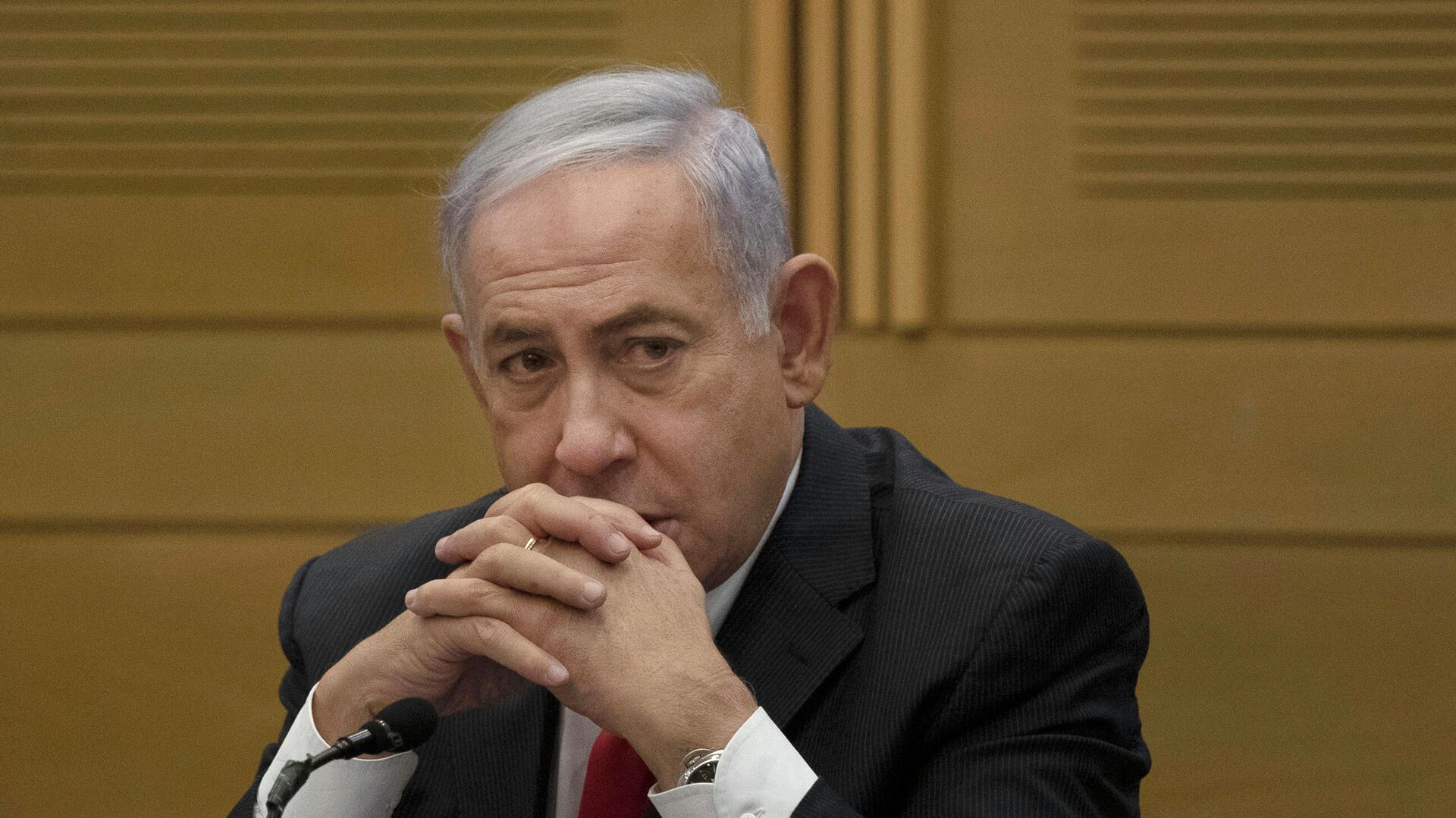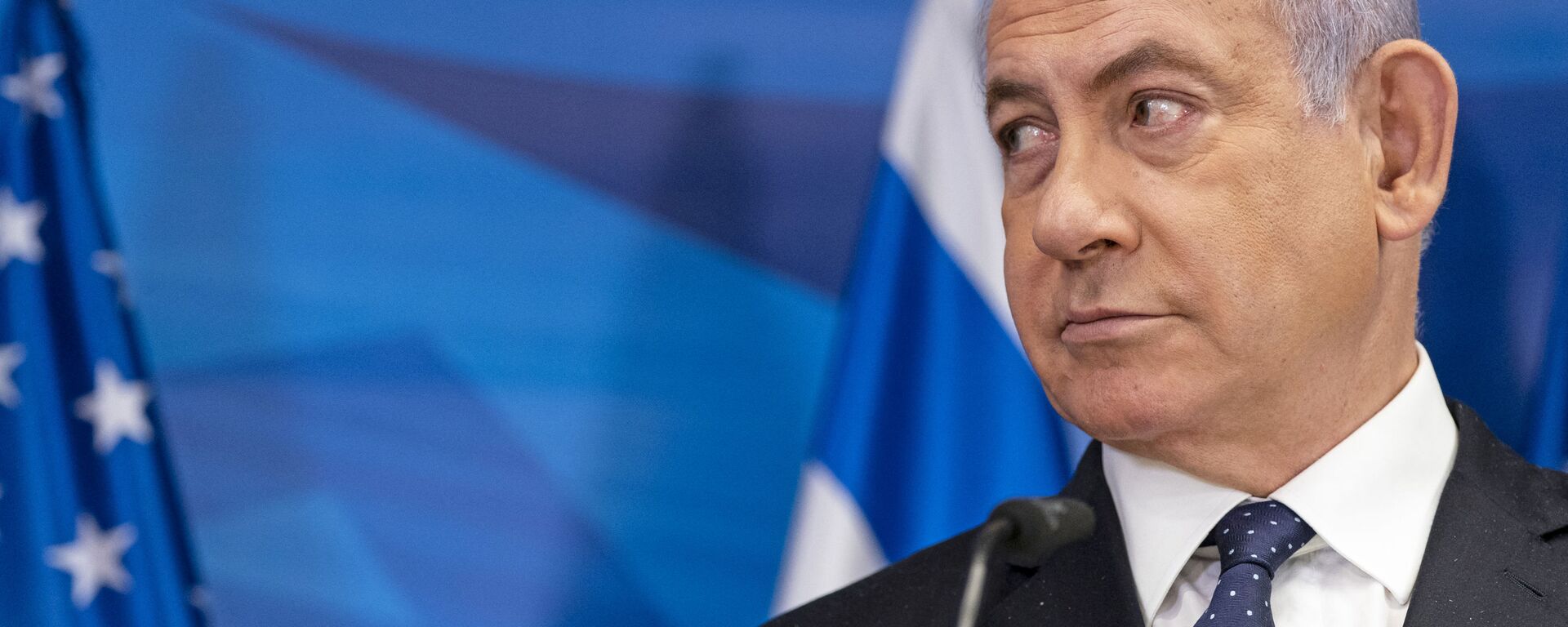https://sputnikglobe.com/20220720/netanyahus-poll-victory-not-yet-guaranteed-but-fiscal-woes-might-pave-way-for-comeback--1097602460.html
Netanyahu's Poll Victory Not Yet Guaranteed But Fiscal Woes Might Pave Way For Comeback
Netanyahu's Poll Victory Not Yet Guaranteed But Fiscal Woes Might Pave Way For Comeback
Sputnik International
According to recent surveys, Benjamin “Bibi” Netanyahu's Likud party is still leading in the polls gaining 34 out of the 120 seats in the Knesset - the Israeli... 20.07.2022, Sputnik International
2022-07-20T10:39+0000
2022-07-20T10:39+0000
2022-07-20T10:40+0000
israel
benjamin netanyahu
knesset
election
https://cdn1.img.sputnikglobe.com/img/07e6/03/0e/1093842994_0:27:2595:1486_1920x0_80_0_0_dcd47ee3d1cb16ba9d8f1cb7056011e7.jpg
His political allies, three religious parties – the Otzma Yehudit/Religious Zionist coalition, Shas and United Torah Judaism - are set to get 25 votes, meaning the former prime minister is only two seats short of forming a government.The week has been positively replete with political drama. On Monday, the primaries for the leadership of the liberal Labor party grabbed headlines, as Transportation Minister and party leader, Merav Michaeli, beat the party’s secretary-general Eran Hermoni into nabbing the top spot.Then, on Tuesday, the Likud party startled viewers as it cancelled its planned leadership election after Yuli Edelstein, a former health minister, announced that he would not take part in the race, leaving former Prime Minister Benjamin Netanyahu unopposed at the party’s helm.Later that day, Meretz, the left-wing social democratic party which advocates a two-state solution, was locked in a wrangle when Yair Golan, who had looked a safe bet after the present leader Nitzan Horowitz announced at the beginning of the month that he wouldn’t be standing for the party’s leadership, suddenly found himself challenged by former party leader Zehava Gal-On.As if that were not enough, there were talks between two religious factions and Likud allies - Otzma Yehudit, run by Itama Ben-Gvir, and the Religious Zionist Party, led by Bezalel Smotrich - mulling over a joint run which could cost Likud and its allies 10 seats.What will these and other developments mean for how seats are distributed in the Knesset? And which side - pro or anti-Netanyahu - will end up winning the parliamentary race set for 1 November? Sputnik breaks it down.The Anti-Netanyahu Bloc:This bloc comprises five main parties which couldn’t be more unalike, so diverse are their ideologies. However, they do have one unifying goal which has drawn them together. and that is to prevent a Netanyahu comeback.The leader of this union is the present Prime Minister Yair Lapid, who is also the head of Israel's second largest party, the liberal party, Yesh Atid.His fellow anti-Netanyahu allies include Defence Minister Benny Gantz who is in charge of the social liberal Blue and White party which has recently absorbed a smaller faction; the Labor party which Michaeli has just come to the head of; Yisrael Beitenu, the National Secularist party for Russian speakers that is led by Finance Minister Avigdor Liberman; and the social democrat Meretz which is likely to be led by its former leader Gal-On, a veteran politician and a fierce critic of Netanyahu.Collectively - and according to recent media polls - these parties are expected to win 51 out of the Knesset’s 120 seats leaving them 10 spots short of gaining power.To obtain the magic number of 61 seats, Lapid and his allies would need to ally with two Arab parties, the Joint List which is described as a Big Tent/Minority Interests party for Israeli Arabs – and Ra’am, and Islamic Democracy party for the Israeli Arab Sunni Muslims and the Bedouin of the Negev. The two parties represent six and four seats respectively. But experts have already warned that such a combination could not work.Although within this bloc there are some liberal politicians who are willing to cooperate with Arab parties (such as Labor and Meretz, and, to some extent, Lapid's Yesh Atid), it also contains conservatives that would baulk at such an alliance. The main objection could come from Gantz and his new partner, the Justice Minister Gideon Sa’ar. Previously, under former PM Naftali Bennett, they worked together in a government that was backed by Ra’am but that cooperation attracted criticism, and analysts feel they would be reluctant to repeat the experience.Under such circumstances, Lapid’s only hope is to sweet-talk some of the Haredi parties - who are believed to be in Netanyahu's camp - to drop their support for Bibi. But here, another glitch arises. Having been demonized for the past year by Liberman, a stalwart of the anti-Netanyahu bloc, the ultra-orthodox parties are unlikely to join him on the same bench. Lapid is now trying to find alternatives: either to fix relations between the two parties; or to establish yet another religious party that might be willing to join his bloc. Either way, Lapid will need to come up with solutions quickly if he doesn’t want to give up his seat as premier.The Pro-Netanyahu Bloc:Former PM Netanyahu is still leading in media polls where his Likud party, Israel's biggest, looks likely to secure between 34 and 36 seats at the parliament.Other members of his bloc include three religious parties: the Zionist Movement, Shas and the United Torah Judaism with 10, eight and seven seats respectively.According to that calculation, the Netanyahu bloc looks at present able to secure anything between 59 and the all-important 61 seats, although many media surveys show the former premier is still a couple of seats short of making a come-back.If these polls are accurate, Netanyahu - like Lapid - will need to be creative and woo the missing signatures that would catapult him once more into the prime minister’s slot. The only trouble is that he has made some powerful enemies who are unlikely to forget their resentment any time soon.Such is the case with Liberman, formerly a defence minister under Netanyahu, who resigned over what seemed to be unbridgeable differences with the premier.Another one is Sa’ar, formerly a member of Likud, who was left fuming having never received the recognition he felt he deserved. Or Gantz, who served with Netanyahu and expected to take the top job when Netanyahu came to the end of his tenure, but was never given a chance to do so.Netanyahu is aware that trying to charm might be a mission impossible. And this is the reason why he now concentrates on making sure that his own party will win enough seats rather than to depend on others.Ever since the date of the coming elections had been announced, Netanyahu has devoted his time to touring the country, meeting people and convincing them that they need him for the country to succeed.He has promised better security and a higher level of living - the two issues that have been bothering Israelis the most. And while the price of water, electricity, property, fuel and basic food products continue to climb as the current government struggles to contain the problem, Netanyahu's path to the top job might just have become a little bit easier.
https://sputnikglobe.com/20220525/elections-around-the-corner-what-future-is-there-for-israels-ruling-coalition-1095762228.html
https://sputnikglobe.com/20220718/netanyahu-still-faces-trial-but-he-might-end-up-winning-heres-how-1097415407.html
israel
Sputnik International
feedback@sputniknews.com
+74956456601
MIA „Rosiya Segodnya“
2022
News
en_EN
Sputnik International
feedback@sputniknews.com
+74956456601
MIA „Rosiya Segodnya“
Sputnik International
feedback@sputniknews.com
+74956456601
MIA „Rosiya Segodnya“
israel, benjamin netanyahu, knesset, election
israel, benjamin netanyahu, knesset, election
Netanyahu's Poll Victory Not Yet Guaranteed But Fiscal Woes Might Pave Way For Comeback
10:39 GMT 20.07.2022 (Updated: 10:40 GMT 20.07.2022) According to recent surveys, Benjamin “Bibi” Netanyahu's Likud party is still leading in the polls gaining 34 out of the 120 seats in the Knesset - the Israeli parliament.
His political allies, three religious parties – the Otzma Yehudit/Religious Zionist coalition, Shas and United Torah Judaism - are set to get 25 votes, meaning the former prime minister is only two seats short of forming a government.
The week has been positively replete with political drama. On Monday, the primaries for the leadership of the liberal Labor party grabbed headlines, as Transportation Minister and party leader, Merav Michaeli, beat the party’s secretary-general Eran Hermoni into nabbing the top spot.
Then, on Tuesday, the Likud party startled viewers as it cancelled its planned leadership election after Yuli Edelstein, a former health minister, announced that he would not take part in the race, leaving former Prime Minister Benjamin Netanyahu unopposed at the party’s helm.
Later that day, Meretz, the left-wing social democratic party which advocates a two-state solution, was locked in a wrangle when Yair Golan, who had looked a safe bet after the present leader Nitzan Horowitz announced at the beginning of the month that he wouldn’t be standing for the party’s leadership, suddenly found himself challenged by former party leader Zehava Gal-On.
As if that were not enough, there were
talks between two religious factions and Likud allies - Otzma Yehudit, run by Itama Ben-Gvir, and the Religious Zionist Party, led by Bezalel Smotrich - mulling over a joint run which could cost Likud and its allies 10 seats.
What will these and other developments mean for how seats are distributed in the Knesset? And which side - pro or anti-Netanyahu - will end up winning the parliamentary race set for 1 November? Sputnik breaks it down.
This bloc comprises five main parties which couldn’t be more unalike, so diverse are their ideologies. However, they do have one unifying goal which has drawn them together. and that is to prevent a Netanyahu comeback.
The leader of this union is the present Prime Minister Yair Lapid, who is also the head of Israel's second largest party, the liberal party, Yesh Atid.
His fellow anti-Netanyahu allies include Defence Minister Benny Gantz who is in charge of the social liberal Blue and White party which has recently absorbed a smaller faction; the Labor party which Michaeli has just come to the head of; Yisrael Beitenu, the National Secularist party for Russian speakers that is led by Finance Minister Avigdor Liberman; and the social democrat Meretz which is likely to be led by its former leader Gal-On, a veteran politician and a fierce critic of Netanyahu.
Collectively - and according to recent media
polls - these parties are expected to win 51 out of the Knesset’s 120 seats leaving them 10 spots short of gaining power.
To obtain the magic number of 61 seats, Lapid and his allies would need to ally with two Arab parties, the Joint List which is described as a Big Tent/Minority Interests party for Israeli Arabs – and Ra’am, and Islamic Democracy party for the Israeli Arab Sunni Muslims and the Bedouin of the Negev. The two parties represent six and four seats respectively. But experts have already warned that such a combination could not work.
Although within this bloc there are some liberal politicians who are willing to cooperate with Arab parties (such as Labor and Meretz, and, to some extent, Lapid's Yesh Atid), it also contains conservatives that would baulk at such an alliance. The main objection could come from Gantz and his new partner, the Justice Minister Gideon Sa’ar. Previously, under former PM Naftali Bennett, they worked together in a government that was backed by Ra’am but that cooperation attracted criticism, and analysts feel they would be reluctant to repeat the experience.
Under such circumstances, Lapid’s only hope is to sweet-talk some of the Haredi parties - who are believed to be in Netanyahu's camp - to drop their support for Bibi. But here, another glitch arises. Having been demonized for the past year by Liberman, a stalwart of the anti-Netanyahu bloc, the ultra-orthodox parties are unlikely to join him on the same bench. Lapid is now trying to find alternatives: either to fix relations between the two parties; or to establish yet another religious party that might be willing to join his bloc. Either way, Lapid will need to come up with solutions quickly if he doesn’t want to give up his seat as premier.
Former PM Netanyahu is still leading in media polls where his Likud party, Israel's biggest, looks likely to secure between 34 and 36 seats at the parliament.
Other members of his bloc include three religious parties: the Zionist Movement, Shas and the United Torah Judaism with 10, eight and seven seats respectively.
According to that
calculation, the Netanyahu bloc looks at present able to secure anything between 59 and the all-important 61 seats, although many media surveys show the former premier is still a couple of seats short of making a come-back.
If these polls are accurate, Netanyahu - like Lapid - will need to be creative and woo the missing signatures that would catapult him once more into the prime minister’s slot. The only trouble is that he has made some powerful enemies who are unlikely to forget their resentment any time soon.
Such is the case with Liberman, formerly a defence minister under Netanyahu, who resigned over what seemed to be unbridgeable differences with the premier.
Another one is Sa’ar, formerly a member of Likud, who was left fuming having never received the recognition he felt he deserved. Or Gantz, who served with Netanyahu and expected to take the top job when Netanyahu came to the end of his tenure, but was never given a chance to do so.
Netanyahu is aware that trying to charm might be a mission impossible. And this is the reason why he now concentrates on making sure that his own party will win enough seats rather than to depend on others.
Ever since the date of the coming elections had been announced, Netanyahu has devoted his time to touring the country, meeting people and convincing them that they need him for the country to succeed.
He has promised better security and a higher level of living - the two issues that have been bothering Israelis the most. And while the price of water, electricity, property, fuel and basic food products continue to climb as the current government
struggles to contain the problem, Netanyahu's path to the top job might just have become a little bit easier.





